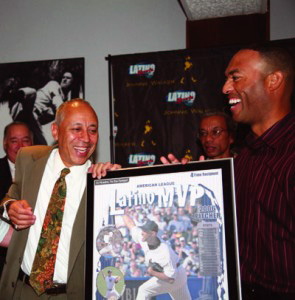
Luis Pabon meets Yankee pitcher Mariano Rivera
By Leandro Fortyz
Bronx Journal Staff Writer
Originally published Spring 2008
A young boy walks into the Latino Sports store, but the clerk isn’t trying to sell him a jersey or trading cards. “How are your grades?” Byron Hunter asks.
At any other sports memorabilia store, that’s not necessarily the approach you would expect from a sales clerk. But Latino Sports is much more than a store and Hunter is much more than a clerk. With his friend Julio Pabon, Hunter is one of two well-known Bronx community activists involved in a unique venture.
This store, on 144th street and the Grand Concourse, sells posters, jerseys, books, trading cards, baseball caps, and many others sports collectables – the kind that make Latinos proud of their star athletes. But it is also a museum, where many unique items are on exhibit; a learning center, where children are encouraged to do well in school; and an advocacy organization that fights to make sure that Latinos athletes get adequate recognition.
In fact, this Bronx institution was born as a reaction to an injustice that many people felt was commitment against a Latino baseball player.
It was the fall of 1989 and Pabon, a Bronx native and former member of the Dinkins Administration, found a bunch of angry baseball fans as he arrived at the airport in San Juan, Puerto Rico.
“There was all this commotion,” Pabon says. “People were talking about ‘discrimination’ and ‘injustice,’ the words that I’m used to hearing as an activist on the streets of New York. But I didn’t know why they were so offended. So I asked my friend and he said, Bro, you haven’t heard the news? Ruben Sierra should have been the MVP and they gave it to Robin Yount.”
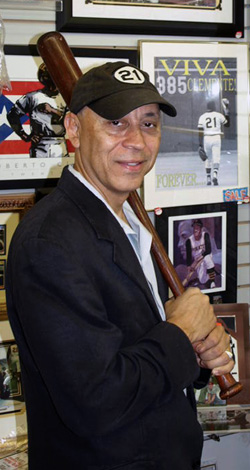 The incident made Pabon realize his true calling. He went on a mission to give Latino athletes the recognition they are often denied.
The incident made Pabon realize his true calling. He went on a mission to give Latino athletes the recognition they are often denied.
“I learned real quickly that of the seven offensive categories – like homeruns, doubles, triples, whatever – Ruben Sierra led the league in five,” Pabon said. “Everyone thought that Ruben Sierra, a black Puerto Rican from the caserios, the projects in one of the worst areas in Santurce [section of San Juan] … had made it to the top. They were waiting for the announcement so they could celebrate. But the baseball writers gave it to Robin Yount, who also had a good year, but many people felt that Sierra was overlooked.”
He came back to New York determined to create a new award: The Latino MVP, now regarded as an elite award in baseball. “It just hit me,” Pabon said. “It was like a lightning bolt.”
He said that having been a teacher and a political activist in New York City, “I realized that no matter how good you can be, if they don’t recognize you, it’s all lost. And so many Latino kids could have gotten so much motivation from knowing that this guy from Purto Rico, from the slums, made it to the top. Maybe it could have made a difference to a kid in the South Bronx, or to a kid in East LA, or Chicago.”
Since he lived practically across the street from Yankee Stadium, Pabon came back to the Bronx, bought a trophy and waited for the Texas Ranges – and Ruben Sierra – to come play the Yankees. He bought tickets for a group of community children to attend a Yankees-Rangers game, gave Sierra the trophy, received received some publicity from local newspapers, and the Latino MVP award was born.
Since its inception, the award has been given to many superstars like Albert Pujols and David Ortiz. The most recent recipient was Yankee pitcher Mariano Rivera, who received the recognition in a special ceremony at Yankee Stadium in September.
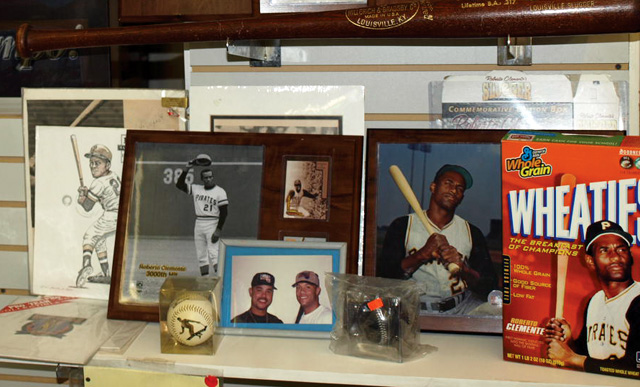 Rivera said he was proud of the award because Latino Sports has made a huge impact both in Major League Baseball and the Hispanic community. “It’s an honor to receive this award from Latino Sports because they are a first-class organization,” Rivera said. “Their service to the community has helped many children.”
Rivera said he was proud of the award because Latino Sports has made a huge impact both in Major League Baseball and the Hispanic community. “It’s an honor to receive this award from Latino Sports because they are a first-class organization,” Rivera said. “Their service to the community has helped many children.”
But the MVP award was only the beginning. When Pabon saw the positive reaction the award created in the Hispanic community, he set out to build a community based organization and a Latino memorabilia store – both on the Grand Concourse and online at www.latinosports.com.
“You would be surprised as to how many people buy our merchandise over the net,” Hunter said.
With funding from private donors, corporate sponsors and store sales, Latino Sports hosts various community events during the year. The store is also equipped with three computer/internet stations that are available, free of charge, to community children who may not have internet access at home.
But mind you, there is a fee: Good grades. “If they get an A or 100 on a test they can use the computers for free,” said Hunter, explaining that he loves his job. “I wouldn’t change my life with any athlete I have had the pleasure to meet and work with,” Hunter added. “I am happy making a difference in children’s lives.”
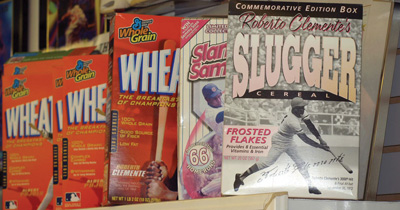
By raising issues of concern to Hispanic sports fans, Latino Sports has been instrumental in getting Major League Baseball to pay more attention not only to Latino ball players, but sports executives. Omar Minaya, for example, became the first Latino general manager in baseball, after Latino Sports embarrassed the New York Mets for initially overlooking Minaya when he was the assistant general manager. In 1999, when Major League Baseball named an all-century team without a single Hispanic player, Latino Sports raised such a stink that, five years later, the league named an all-Latino team and asked Latino Sports to serve as consultant on the selection.
Recently, Pabon and Hunter have been heading a campaign to convince Major League Baseball to retire Roberto Clemente’s number 21 throughout every team in the league. The great Puerto Rican star of the Pittsburg Pirates was killed in a plane crash as he was taking relief goods to earthquake victims in Nicaragua. Pabon and Hunter even produced a documentary on Clemente, which is now being used to drum up support for the “Retire 21” campaign.
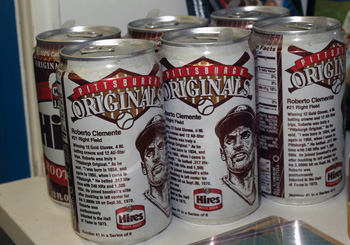 “Clemente should not be forgotten, not because he was a great baseball player, not because he was a great man, but because the combination of all the things that he was,” Pabon said. “He was always giving back to the community. He was an activist while he was a superstar and that’s very rare. We will keep Clemente’s name in everyone’s minds and never let them forget the legacy he left behind,” Pabon added. “His number should be retired throughout baseball, just like Jackie Robinson’s number was retired.”
“Clemente should not be forgotten, not because he was a great baseball player, not because he was a great man, but because the combination of all the things that he was,” Pabon said. “He was always giving back to the community. He was an activist while he was a superstar and that’s very rare. We will keep Clemente’s name in everyone’s minds and never let them forget the legacy he left behind,” Pabon added. “His number should be retired throughout baseball, just like Jackie Robinson’s number was retired.”
In the spirit of Clemente, Latino Sports is constantly finding ways to give something back to the Bronx community, from its Back to School Kids Day, when the store donates backpacks and school supplies to community children, to its celebrity basketball game and family day, when children are given free health services and ID cards, “so they don’t get lost,” Pabon says.
“Each of these things has impact on everyone that comes to these events,” he added. “It’s like putting seeds in their minds, and later on those people develop.”
But going back to its original mission of giving more recognition to Latino athletes, Latino sports is planting another seed: Developing Latino sports writers who can eventually get to vote on who gets inducted into baseball’s Hall of Fame.
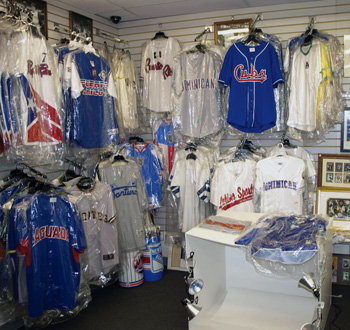 “Many past Latino ball players have the same statistics as players that are in the Hall of Fame, but they haven’t received the proper recognition,” said Pabon, who noted that this may be happening because there aren’t enough Latino writers voting in the Hall of Fame balloting.
“Many past Latino ball players have the same statistics as players that are in the Hall of Fame, but they haven’t received the proper recognition,” said Pabon, who noted that this may be happening because there aren’t enough Latino writers voting in the Hall of Fame balloting.
For that reason, Latino Sports lends moral support to students and young media professionals looking to gain experience in sports reporting and broadcasting for community newspapers and television. As the number of Latino writers grows, so will the number of Latino Hall of Fame inductees, Pabon said.
So what’s next for Latino Sports? Pabon said he would like to start a partnership with local high schools to develop more learning opportunities for young athletes – not only on the field, but academically as well.
At Latino Sports, they like to dream big. “I will eventually like to see our logo everywhere, like on sneakers, shirts, billboards,” Pabon said. “That’s what I see for the future of Latino Sports.”
Pabon and Hunter have found meaning in their lives by helping their community advance in many areas, from promoting education and instilling pride to finding ways for young people to make an honest dollar, like distributing flyers around their neighborhood.
“The kids feel good when they have a chance to make a couple of dollars and realize they don’t have to hustle on the street,” Pabon said. “It puts a smile on their face and a bigger one on mine.”


